#also delving into canon can reveal some really interesting plot devices
Explore tagged Tumblr posts
Text
writing anything for a new fandom is already an intimidating enough prospect for me (what if I characterise these ppl wrong, what if I contradict canon?) but then bionicle is on some other level because everything is divided into six variations (visorak, regions, vahki) each with their own names and powers and traits and uggggggggh
#bionicle#anyway s/t i wanted to write to flesh out web of shadows has devolved into several pages of notes#'why dont you just write and not worry about it?' i cannot tell you how much i cannot do that#also delving into canon can reveal some really interesting plot devices#i love that there is so much canon to play with#but oy boy#this should keep me entertained for a while#i have a very bare outline but i need the minor (situational) conflicts to push the internal character conflicts
8 notes
·
View notes
Note
Hi! I'm a gay fan of 911 and I have a question about the whole Buddie fandom. As much as I like Buck and Eddie, it's frustrating that a HUGE part of the fandom is pushing for these two characters to get together instead of putting energy into supporting Hen & Carla and Michael & Dave. Not to mention Carlos and TK in Lone Star. Can you explain to me the appeal of wanting these two men together? Wouldn't it be more interesting to see two heterosexual males just be able to bond in a non-toxic fashion? That's something we don't get to see often on television.
Hey! This is MAD long lmao I am so sorry! You caught me on a day I felt like talking! Also this took like a year to answer you lolololol. This does have a few ʻhot takesʻ so please be warned! So like in this essay....
So first I am also apart of the LGBTQIA+ community, so I do understand how it could come across as a fetish or being non supportive of the current canonically LGBTQIA+ characters, however I think a lot of the interest around Buddie and the want for them to be confirmed as a couple is how they are being written. Me personally I knew since s2 e1 Buck and Eddie were written not as rivals but as two people who would eventually become friends, but it wasn’t until the Christmas episode with the elf assuming Buck was Chris’s dad and Eddie’s partner that I was like ‘hold on!’ because I was really hoping Abbey would return and I didn’t see Eddie as a possible Buck live interest because of that. The elf’s comment wasn’t played off like most other shows would (think Dean and Sam arriving anywhere in Supernatural) it made me go back and look at the other episodes to see exactly how Buck and Eddie were being framed/written. And as we have moved into further seasons I think there has been a shift in how Buddie is being written, in s3 it was very much like two people progressing into a deeper friendship then the blood clot/lawsuit gets in the way and they both have to deal with emotions surrounding that, then Buck’s response to Eddie being trapped (we see how is he when Boddy is trapped in a fire WITH A GUNMAN, it’s emotional but not to the point is is with Eddie), even the love interests feel very pushed on us and there’s so little banter between Buddie about their gfs and how they feel about these new beginnings. It feels off, not like a friendship in the slightest, more like two people trying to force something and not wanting to deal with any other feelings. Then when Eddie gets shot and reveals Buck is Chris’s legal Guardian in the event Eddie dies, that’s huge, and he did this after only a year of knowing Buck (I have friends with kids. I’ve known one of them for FIVE years, I’m at their house every week, the kid calls me family. I’m person #10 on the list of ‘who gets my kid if I die’, not #1 lol) It just feels like it’s all building up to something, and people are getting tired of waiting for that something! We’re all emotionally tired from the past two years, and probably from many shows queerbaiting us and this is something that could happen, seems to be something the actors are ok with and the fans want. So why do they keep drawing it out. This isn’t about us demanding they ignore the chance to write a healthy platonic male friendship, or forcing two characters to be gay, it’s about holding the writers to what they’ve implied and seeing what could come of it.
Also think of it like this; If Buddie is confirmed it will still be a good example of a healthy friendship which then developed into something else, like Booth/Bones! Showing the natural progression of friendship to relationship that happens a lot in real life. It’s two men who previously (on screen at least) have only been with woman, but now they have an emotionally connection with someone which they then develop and explore. This could be 911’s first nontoxic depiction of two gay characters coming together, because sorry not sorry the canon couples aren’t perfect (which does humanize them) but they also reenforce harmful troupes that plaque the LGBTQIA+ community, which I’m sure you understand: TK was a drug addict, who only got with Carlos at first cause he was hot and sex was TK’s new addition (all gay men are sex addicts who do drugs and sleep with anything that moves). Carlos was ashamed and wanted to keep TK on the downlow (poc gay men want to pretend to be straight but have free access to gay sex). Hen cheated on Karen seemingly the first chance she got (lesbians can’t handle monogamy when pushed, and cheat on their long term partners). All known and documented troupes that happen far too often.
I’m not saying Buddie is some gay jesus ship that’s gonna save the entertainment industry but if done right it could prove to be one of the few healthy depictions of two men getting into a gay relationship we have. If they plan it out correctly, show us the relationship development, like they did with Maddie/Chim for example, Buddie could be used as a positive example of a gay fictional relationship (I really could go into depth about this. I probably should tbh).
As for not supporting Hen and KAREN, or Michael and DAVID, I think fans do support them! The writers don’t. If you read fanfics Henren and Michael/David are featured heavily in many fics, and ik some people might say ‘well they’re only there so Buddie can talk about their gay side!!’ but both these couples have their own fans and fanfic tags! They aren’t just plot devices in Buddie stories. There is a huge side of the fandom that supports Henren and wants to see more of them and their family. Same with Michael and David, during the episode where Michael and Bobby team up to find that plastic surgeon who was working illegally many people where ecstatic that we were getting more Michael/David content and that David was getting more than a couple lines. But sadly it seems like the writers only want to delve into these story lines when they need filler, they even miss opportunities to include these other LGBTQIA+ characters when it makes sense;
(Someone came for me about this but I am going to bring it up again)
When Chris is sad and wants more human connection, instead of bring Harry + Michael/David and Denny+Nia+Henren back into the picture (and yes I understood at the time the pandemic was bad (lmao still is!!), but all the actors at some point would have/had crossed over into each other’s ‘bubbles’, so ALL the actors would have been exposed to each other so getting the children together with adults they had ALREADY been with during shooting wouldn’t have been a super spreader event) but instead they brought in Ana after only two on screen dates and pretended like it was a logical thing for someone who’s up to that point been extremely careful with their child.
They really could have pushed the ‘118 is a family!’ message here and included the canonically gay supporting characters, and the lesbian main character(s) but they did not and instead chose to push the Ana/Eddie coupling even though they hadn’t properly developed it yet. The writers themselves don’t seem to care about developing their canonically gay characters and including them more than they have to but fans are continuously developing Henren and Michael/David with hc and fics.
I’d like to use your logic against you for a second, in s1 we have a very healthy, platonic friendship between Chim/Bobby but that got written out to the point they are more like boss/employee unless the scene calls for them to seem closer, we now have Bobby and Michael friendship but again we hardly see Michael. On Lone Star we have Owen and Judd as a really, really good example of a healthy male friendship but we see Judd more often with Tommy now then we do with Owen, and in s2 it’s overshadowed by Owen trusting Charlie from Twilight and constantly getting fucked over! Why can’t the writter just be happy with these happy, healthy, emotionally well male-male friendship they’ve already included and expand upon them. There’s enough drama because the show literally involves burning buildings and people’s lives being at risk from some natural/man made disaster ever 12 seconds. Does it need to have so much interpersonal conflict and male peacocking??
#Buddie#Please donʻt get offended by anything in this!!!#These are JUST my opinions which MAY change the further we get into this show!!#ALSO IT IS JUST A TV SHOW!!!! PLEASE BE KIND TO ME AND TO EACH OTHER
25 notes
·
View notes
Text
The 100: 7x01 From the Ashes
Disclaimer: This post is about the episode of the show The 100, From the Ashes, the season 7 premiere, and only about it. In this post, I will NOT be discussing any original scripts, unused takes, bloopers, behind the scene photos or videos, scribbled notes exchanged between the writers, or any tweets, Instagram posts, SMS or e-mails by any of the cast or crew members, considering the fact that none of those things constitute the show’s canon, which consists of the actual episodes.
I will also not be discussing anything about the future episodes posted by any ‘spoiler accounts’, and, in fact, I am unaware of most of these things, since I’m trying not to read any spoilers. Please do not tell me any spoilers for future episodes or ask me about them.
I really enjoyed this episode, in spite of the unfortunate lack of Bellamy (which I was already expecting since what happens to him here was already spoiled by the trailer. Of course, I’m looking forward to see Bellamy again, and, before that, to everyone finding out about disappearance and it becoming the focus of the season. But until then, the show has quite a few other storylines to deal with, from setting up and delving more into the Anomaly mystery, to dealing with the fall-out of season 6 in Sanctum, and both of these were handled well, for the most part.
This episode in particular had really good characterizations all around - for Murphy, Echo, Indra, Madi, Raven, Emori, Gaia, even Jackson - and, of course, Clarke, who had an arc that took her tendency to try to repress her feelings to an extreme, until they exploded in a most memorable way. It will cause her trouble, no doubt, but it was great to watch, and something I had been wishing for for quite some time.
There is just one character whose storyline I’m still not sure how I feel about, because I’m not sure what the show is doing with him.
After the last season’s cliffhanger, there was some concern in the fandom that Bellamy would regress to being all about protecting his sister, after their relationship had been redefined with “You’re my sister, but you’re not my responsibility”. Some of that was really exaggerated: there’s absolutely nothing odd or surprising about Bellamy crying over his sister disappearing in his arms. Of course he loves her and wants her safe. But I was concerned they may regress his development if they make him forget about everyone and everything else in his life in order to impulsively jump after her into the Anomaly. However, that did not happen - Bellamy didn’t decide to go on his own, rather than tell others and make a plan. He was taken.
The mysterious people from the Anomaly seem to be able to control the Anomaly, and have some sort of a cloaking device, presumably connected to their suits and helmets, that makes them invisible to others. They also have some sort of a screen inside their helmets, with facial recognition of targets and commands. It’s all a bit creepy - these seem to be humans, but they are receiving orders the way a robot would. (It’s all very Terminator-like!) Maybe because they also have lost their memories while going through the Anomaly? Where did they get the info about who Bellamy, Gabriel and Echo are - was it from Octavia’s memories?
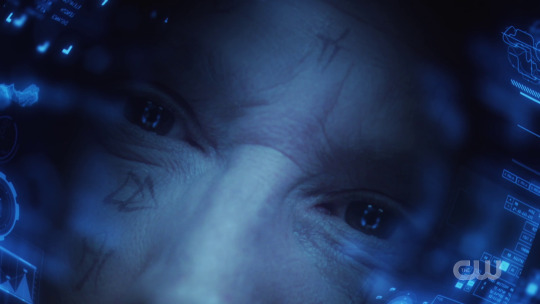
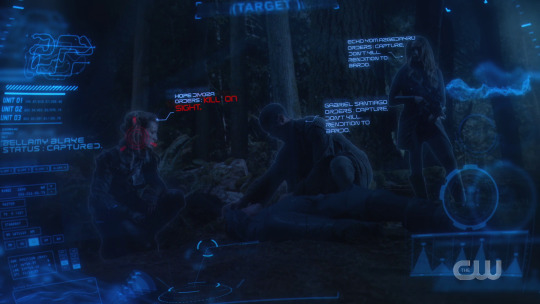
Memories and memory loss are obviously going to play a huge role this season. People who come from the Anomaly to Sanctum seem to lose their memories, except when the Anomaly is still there. Does this happen only on Sanctum, or at the other side(s) as well? How does the fact that the Anomaly sucks in radio signals fit into that? Hope had to use a message she put into her own arm to remind herself to “TRUST BELLAMY”. (Interstellar is mentioned a lot as an inspiration for this season, but this reminds me of another Nolan film, Memento.)
We also see Clarke spout knowledge about how the big mansion was built (by Russell for Simone, to remind her of her house on Earth), which she would know due to still having some of Josephine’s memories. And I’m sure that the fact Madi still has the memories of past Commanders will play a big role - specifically, the fact she has Becca’s memories, which could be the way to tie the present day story to the prequel/story about what happened during and right after the apocalypse. (She also probably knows about Sheidheda more than anyone else alive, which may play into the Sanctum story.)
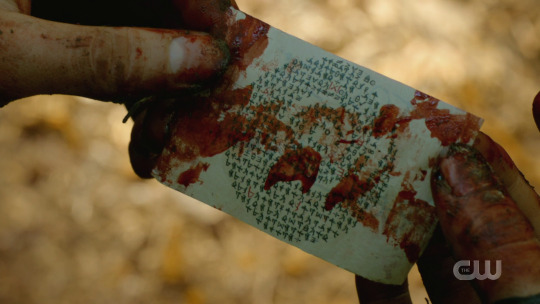
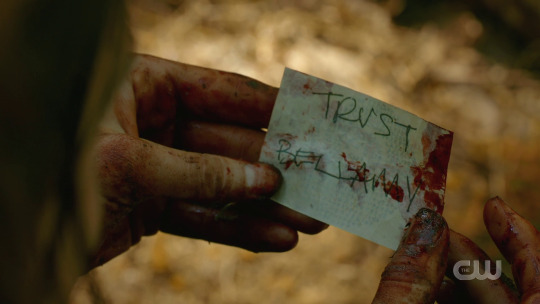
It’s too early to judge Hope as a character, but the mystery surrounding her is certainly super interesting. Why do the mysterious people from the Anomaly have orders to kill her on sight (as opposed to capturing, which they were supposed to do with Bellamy, Echo and Gabriel)? Is it because of who she is, or what she is - is it about her actions, does she know too much, or is her existence itself that’s the problem?
I loved the Octavia cameo in Hope’s hallucination, with the confirmation that she was an “aunt” figure to her, a part of a found family with Diyoza and Hope. The Anomaly makes you see your biggest desire or biggest fear - and Hope’s biggest desire seems to be to be reunited with her family
Echo’s hallucination, on the other hand, is obviously about her biggest fear - so it makes perfect sense that it’s Roan who appears to her, as he exiled her from Azgeda. Of course biggest fear would be losing her kru and her king/queen and being left alone and adrift. I’m as surprised as anyone that I found Echo's scene to be maybe the best in the episode. But she did have some really good character moments in seasons 6, and this is IMO her best character moment so far, picking up from her red sun hallucination in 6x02, and flashback from 6x11. which revealed that even her identity as “Echo” is fake. It seems the show is finally doing the character development it neglected to give her in season 5, and addressing all the obvious issues with Echo’s development and her relationship with Bellamy. I think this confirms that it was indeed Echo talking to herself while hallucinating Emori in 6x02, since her hallucination of Roan tells her the same thing, that she is still just a killer following another master’s orders. We finally see Echo feeling guilt over the things she did in the past, including her betrayal of Bellamy in season 3. When she imagines him calling her out on betraying “the man she now claims to love”, is it just about her thinking the others would doubt her love, or is she herself questioning whether her feelings for Bellamy are really romantic love, or just loyalty to her current leader? Their relationship, especially in S6, often came off more as the latter.
(It was also really cool to see Zach McGowan again)
The timeline of 7x01 seems to have confused some fans, but I think it’s pretty obvious that, at the beginning of the Sanctum story, no more than a day (probably less than that) has passed since 6x13 - going by the facts that 1) the Anomaly storyline picked up minutes after the end of 6x13, and the Sanctum story was presumably happening at the same time, and 2) Indra had to explain the situation in Sanctum to everyone. The only thing that seems to go against that is that Russell is said to “not have slept” since what happened on the ship, which makes it seem like it’s been longer. Or maybe Russell was just being extra dramatic. “Oh, I have no slept for a whole day!” He certainly spent a lot of this (his last) episode feeling sorry for himself. At least he seemed to have finally realized he wasn’t the superior good guy in all of it (”Tell them I’m treated better than I deserve” - yes, indeed.)
Indra was great, even though poor Adina was forced to be an exposition machine for a part of the episode.
A common complaint I’ve seen among fans is that it’s weird that Clarke and others in Sanctum aren’t worried about Bellamy and co. I don’t understand this complaint, as it’s clear that very little time has passed and that Bellamy, Octavia, Echo and Gabriel must have told everyone they were leaving and why (though I don’t know how many details they told them about the Anomaly Stone). People have been gone for a whole day in season 6 when they just went to the Offering Grove (Echo in 6x06) or the radioactive shield (Raven, Emori and Echo in 6x05), which are within the confines of Sanctum and much nearer than the camp by the Anomaly. What are they supposed to do but wait for a couple of days for them to come back? It’s not like they can call them, when radios and other means of communication usually don’t work on Alpha because of the Anomaly sucking the signals.
In fact, their absence was mentioned in the picnic scene, when Raven toasted to “absent friends” and we got a reaction shot of Clarke (I know, Clarke, I'd be annoyed too if I was you, but Bellamy had to be all "I'm gonna go now and explore the Anomaly Stone while Sanctum is in chaos and you're in mourning for your mom" because the plot needed him to..., before Niylah toasted to the “departed ones” (which would include Kane and Abby) and we got a close-up reaction shot of Clarke trying to keep it all inside, as she did every time in this episode someone mentioned Abby.
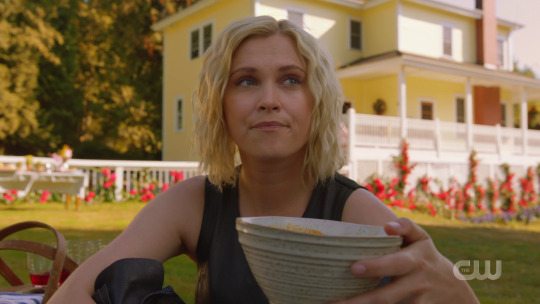
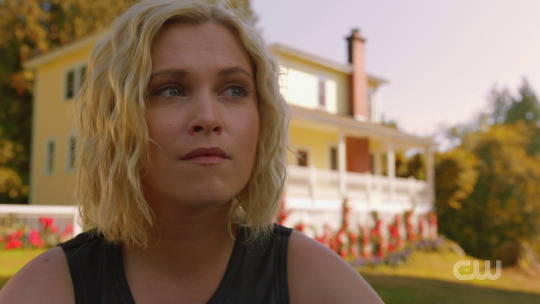
The idyllic picnic by the mansion - everyone’s attempt to get some rest and nice time after everything they had been through - was such a contrast to the “powder keg” of Sanctum and the end of this episode. But it also felt fake - just as fake as the deception and lies that Murphy and Emori are Daniel and Kaylee Prime, or that Madi still has the Flame in her head - to keep the devout and Wonkru under control, respectively - and just as fake as Clarke’s attempts to convince everyone she’s “fine”. As usual, the song playing in the background (”Darkness” by Pinegrove) was very fitting:
Suddenly I find I've got darkness on my mind It's a question mark that keeps me looking And it's never satisfied And it's never what I thought Saying I'm happy when I'm not No, I got darkness on my mind Leaning out the frame When it's particulate and gray I'm perpendicular to my whole being When I lean a certain way Saying I'm happy when I'm not Finding roaches in the pot Oh, I got darkness on my mind Some people spend their whole lives looking For someone who could understand While meanwhile a lilac blooming Sometimes on the driest land And I know it's been a long time coming I'm angry and I know that's weak And I'm longing out that open window For whatever it is I seek [musical breakdown] Some people spend their whole lives looking For someone who could understand And while meanwhile a lilac blooming Sometimes on the driest land And I know it's been a long time coming I'm angry and I know that's weak So I'm trying not to be so bitter I'm just looking at it honestly Well, I know it's been a long time coming I'm angry and I know that's weak And I'm longing out that open window For whatever it is I seek Some people spend their whole lives looking For someone who could understand While meanwhile a lilac blooming Sometimes on the driest land, yeah
I like that there was anger, blame and conflict between our kru and that everyone didn’t just forget what happened last season (and for once, Clarke is not the one getting the blame!) It would've made no sense if no one was blaming Murphy, and it makes sense it would be Jackson, who was so close to Abby and who’s not particularly close to Murphy. It also makes sense there was disagreement about the method of keeping peace in Sanctum, and that not everyone would be happy with Memori cosplaying the Primes.
Murphy himself had a really good characterization in this episode - we saw his grief and his feelings of guilt. While he tried to defend himself when blamed that he didn’t know what Russell would do, when left alone, he blamed himself for various actions that led to it, which is something Murphy from a couple of seasons ago wouldn’t do.
It’s great to see Raven looking more like her old, pre-season 6 self, and even better to see that her self-righteousness has gone. She’s more like the old Raven but without the snarky b1tchiness. I’m glad that she got called out by Murphy on her “Miss Morality” role from last season (which never really made sense, pre-time jump Raven was never a moral compass of the group, she was smart, pragmatic and could be as ruthless as anyone).
Another major theme of the Sanctum plot were the new beginnings. Clarke pointing out season 3 feels like another world seems almost like the show going meta and pointing out to the audience how much Clarke and all these people have lived through and been since.What is Sanctum now after the Primes have been defeated, with Children of Gabriel coming back home and clashing with the Devout - brainwashed and loyal followers of the Primes, with the rest of the Sanctumites in between? How are Wonkru and the 36 Eligius prisoners going to start again on a new planet moon? (36?! Wow, so they really suffered heavy losses in that gorge, too, when there are so few left?) Can Grounders be without a Commander? Gaia without her religion? Can Madi be a normal kid, without the Flame - or is that even possible while she has to pretend to still be Heda? The title From the ashes seems to refer to that - and maybe the end of the episode means that you have to burn down the old beliefs and old idols to build something new?
Mothers and daughters were another theme. I liked that Madi mentioned her biological parents (well, mother) on-screen for the first time, since the fandom tends to forget about them and ignore them too often. Madi was unsuccessful in her attempt to make Clarke share her feelings with her - maybe because this conversation showed a big difference in how they see each other? Clarke thinks of Madi as her child, but Clarke has never had a child before, while Madi had parents and suffered their loss; Clarke assumed Madi was talking about her and what happened in S6, but Madi always calls Clarke “Clarke” rather than “Mom”, and tried to connect to her on the equal level, as another daughter who’s lost a mother. Maybe it’s exactly because Clarke sees Madi only as her child that she feels she must be “strong” for her all the time and not show grief.
There was an unexpected parallel between Indra and Clarke in how Indra also tried to suppress outward expressions of grief when her partner - Gaia’s father died, which clearly wasn’t healthy and caused a rift between mother and daughter. (I’m not sure about when that happened, i.e. when Gaia first decided to become a Flamekeeper. I guess it must have been before the timeline of seasons 1-3. So Gaia’s dad is probably not the man that Indra recognized in 2x15 as one of the Reapers? I’m still angry that we never got any resolution to that storyline and that the Reapers were forgotten after season 2.)
The one thing I’m not sure about is Jordan’s characterization and arc. I’m not sure what the show is doing with his exactly, and I’m afraid that they’ll try to leave it ambiguous just how much he is or isn’t brainwashed. 6x13 made it very clear that he has been “adjusted”, which Russell confirmed here, and Jordan’s “adjustor”, who was creeping behind him in the season 6 finale, was very present and active in this episode, and clearly still had a big influence on him. At the same time, we learn that Jordan does not believe in the divinity of the Primes - instead of that, his hallucinations made him see something connected to the mystery of the Anomaly, which Russell describes as something “greater” (almost like he has finally found God, of sorts, after all, which he talked about 236 years before when he first landed on Alpha)? The good news is that it means Jordan will have a role in the Anomaly story, rather than being the advocate for the Devout. What I’m afraid of is that the show will gloss over the fact that Jordan was brainwashed - whether or not he came to believe that Primes were gods, he certainly did a 180 from despising Primes as murderers, being outraged by their actions and knowing very well that Priya was not Delilah but someone who took over her body; to (just a few days later, after “adjustment”) spouting Prime propaganda about the “peaceful” society they had before the Bad People from Earth came (that’s the peace they had when they regularly murdered their people to steal their bodies, left babies to die, and made them go crazy and kill each other from time to time) and having some kind of attachment to Priya herself and her mind drive.
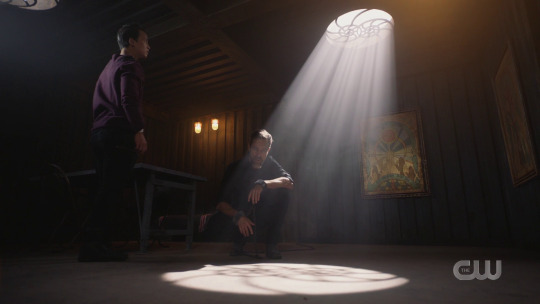
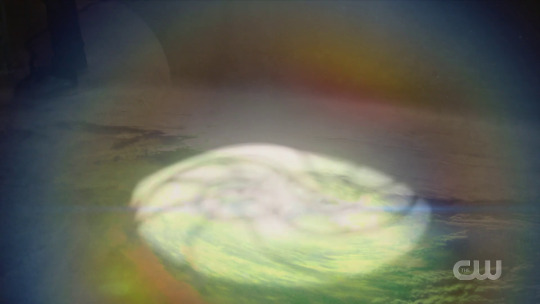
At least, I hope that Russell unceremoniously smashing the mind drive means we’re done with that storyline. I loved it, it was my favorite storyline of the show, but it’s time for it to be over. It makes no sense that anyone is still letting Russell keep his mind drive, for starters. When will they realize they need to destroy these things?
- Clarke’s way of dealing with grief over her mom’s death was certainly unhealthy - repressing her feelings even more than usual, trying to be calm, composed, logical, to do the things needed to keep peace. In her last scene in 6x13, Clarke was open about her grief with Bellamy, looking to him for comfort, finding comfort in his arms and his words. But now he’s absent, there’s no one else she can be that open and vulnerable with. (The only other person Clarke looked for comfort to was Abby.) It’s nice to see that she and Raven have mended their friendship with Raven, she is starting to develop a new one with Gaia over their mutual care for Madi, she has mutual respect with Indra, she’s known others - like Murphy or Miller = for years, since the Delinquent days... and they all want to help her, but she’s not opening up to anyone, not even Madi. She thinks she must be “strong” for all of them, and her Head and Heart are unbalanced - she’s repressing the latter, until she finally explodes.
I love the scene of Clarke finally losing it and beating up Russell (I had already seen it in the trailer, and it was my favorite moment) and then crying while holding Abby's clothes. I don’t know about anyone else, but I love seeing an angry, emotional Clarke, letting it all out, especially when it's anger at people she has every right to be furious at. We haven’t seen that from her since early season 3 (when she yelled and spat in Lexa’s face over her betrayal). It had bothered me for a few seasons that Clarke - who used to be vibrant and could be impulsive, angry, hold grudges, yell at people in seasons 1-2, had become so repressed and muted due to her constant self-blame. I’ve had enough watching Clarke look sad while other people keep yelling at her and blaming her. (The only other instance of Clarke being furious was her hurt and rage at Bellamy and the slap in 5x09, but that was more of a silent, “internally screaming” rage/hurt, which turned into Clarke being emotionally frozen for the next couple of episodes, until learning he was alive. When Clarke is keeping everything inside and not yelling, that’s when she’s in the worst emotional state.)
It is, however, so sad that she still blames herself, too, for her mother’s death, whispering “I’m sorry”, the same way she whispered after seeing her father floated.
My only problem with the scene of that stupid palace burning down is that "mistakes" is a serious real understatement for what Russell has done. I know, I know, this will cause a lot of trouble in Sanctum and Clarke will probably have to go back on some of these decisions to keep peace. But there’s really nothing morally wrong with deciding to execute Russell - not only does he deserve it, but he’s arguably even an exception from the general objection to death penalty, since he’s lived several times the normal human lifespan, by stealing other people’s bodies. And the palace burning down is a symbolic way to send the message that the old power structures are gone - which Clarke pointed out when she said there will be no kings or queens anymore.
Sheiheda taking over Russell’s, or rather his latest host’s body, wasn’t surprising, as that was the most popular theory. But it was cool to see Sheidheda’s creepy mindspace again and Sean Maguire as the original Russell. The bodysnatcher got bodysnatched. That’s something like poetic justice.
I just have to post this because it’s such a beautiful shot!
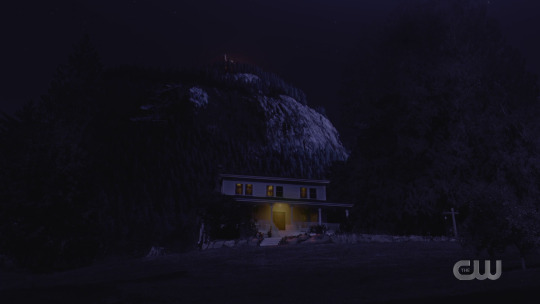
Rating: 8/10
#the 100#the 100 season 7#the 100 7x01#from the ashes#clarke griffin#john murphy#jordan green#bellamy blake#echo kom azgeda#madi griffin#the anomaly
46 notes
·
View notes
Text
Is it possible to go home again? Are your favorite books of childhood actually as good as you remember? Or should they simply remain just that, memories, never to be revisited? I went back to my childhood touchstones to see. The results were varied and interesting.
Chronicles of Narnia by CS Lewis
One of the earliest of my childhood loves to be taken off a pedestal. I was near obsessed with these novels as a child. I found the amount of world-building to be enthralling. It felt grounded and fantastic, and there always seemed to be more out there to be discovered. However, my memory failed me a bit regarding the specifics of the later books (or earlier depending on your preferred reading order).
Revisiting this was crushing. I suddenly remembered being put off by the nonsensical rules that seemed to govern Narnia… sometimes. And Aslan never. There were holes in the storytelling that eclipsed the actual story. And the Christianity. It’s not fair to call it symbolism or imagery. The reason I kept petering out toward the end of the series is that it goes from Christian allegory to a blatant Christian bible retelling. Which, both as a child and adult, is incredibly unfulfilling. But to my younger self, the Rapture ending was unforgivable. There was enough magic in Narnia and the other realms to save everything. Either the people could have rallied, or the citizens of Narnia, or Aslan. In order to stick with the canonical bible ending, Lewis was forced to write an ending where everyone essentially either forgets their power or forgoes their power, giving up and running away. It’s dull, derivative, and didn’t really hold up when I was a kid.
Still, there are aspects of the world-building that appealed to me as an adult. The parts that aren’t Christian, that is. There’s a mundanity to the magic that seems both sincere and slightly ironic. That sensibility is what I’ve kept with me. The fact that after magic is discovered then it simply is. The act of discovery can’t go on forever, and at some point the magic will either be gone or become part of every-day life. And the latter is what Narnia showed me.
Jeremy Thatcher, Dragon Hatcher by Bruce Coville
I was the most nervous about picking this one back up. I’ve written at length about this book meant and means to me. My adult self is delighted to tell you that this book still works. Not necessarily on a prose level. The story is very simple, many details that I recall likely came from my imagination. It moved along as was over before I expected. It was, dare I say, breezy. The book was a perfect cocktail for my younger self because it was made of two ingredients.
The first was Jeremy Thatcher and his dragon. He was simplistic enough that my imagination could put me in his shoes, and his emotional bond with the dragon Tiamat. Style aside, the fact that I had a book with an emotional core to latch on to, rather than the story-driven books I was used to (a la Louis Sachar and the like). That just clicked with me. It stood out from the rest of my books at the time. This variation was showing me a difference between drama and emotional resonance. Did I understand that at the time? Hell no. But I had a book I could get emotional over that featured a dragon.
The other is the framing device of S.H. Elives’ Magic Shop. The shop shows up across a number of titles by Bruce Coville, creating a loose series. The fact that it was a place that revealed itself to each protagonist gave me just a bit of day-dream fuel that the next time I was walking home from school on a foggy day or just biking around town I had a small chance of finding an old shopfront I had never noticed before. And whereas with the wardrobe you get Narnia, or with an owl letter you get Hogwarts, the shop was so mysteriously stocked that I would often wonder what item should call to me from the shelves.
So yeah, this book still has some magic in it. It didn’t blow me away now, but I can clearly see all the parts that cemented it into my imagination as a child.
A Wrinkle in Time by Madeleine L’Engle
This one is probably the most disappointing revisit. I absolutely adored these books as a child. And unlike the Narnia books, I whole-heatedly loved the entire quintet. But upon revisiting these they were the biggest fall from grace, so to speak. Unlike the Narnia books they aren’t blatantly Christian, but they are blatantly pro-religion. There’s a pervasive, albeit holistic, focus on selfless devotion, grace, and faith. To some that may not sound terrible, but I remembered these as being about children who found personal strength. The focus on faith takes away some of their agency and replaces it with a weak version of destiny.
Faith in and of itself is not a good thing. It is made through the pairing of belief and an absence of evidence, which is a terrible combination. Faith, both in definition and in practice within these books, requires a certain degree of ignorance. Faith without ignorance becomes confidence and loyalty. These books made me appreciate mysteries as a part of life, but I hadn’t realized how much they also eschewed the act of solving said mysteries.The takeaway I had with this series as that as a child I believed they were about strength and perseverance, but as an adult they have a strange reliance on faith and fatalism.
Tom Swift Jr. (Tom Swift IV)
Jesus, what was I thinking? The takeaway from these? Shame. Actually, that was what they taught me back then, as well. I stopped reading them after I had chosen it for a “what did you read over the summer” book report in elementary school and then was too embarrassed to talk about it for my presentation. I got a zero.
Okay, in all honesty I could see an anthology TV show being made of these today. They would be over-the-top faux 90s nostalgia and based solely on the covers, rather than any of the actual novels. They’d be produced by (and first episode directed by) Chris Miller & Phil Lord or John Carpenter, depending on how much they wanted to lean into the humor. And lord help me, I’d probably watch it.
The House with a Clock in its Walls by John Bellairs
This was an odd one. If you’ve ever revisited grade school as an adult you know how everything seems so much smaller. Well, the prose felt smaller. I remembered these books as dripping with a wry darkness. Not sinister, but macabre and mysterious. They don’t read that way to me now. Granted, they’re not bundles of sunshine. There’s death, children in peril, and well-meaning adults keeping kids in danger because they don’t believe they need all the facts. This isn’t the dark favorite I remember.
But it’s the foundation of it. There are elements that, when properly fermented and aged, will grow into my love of dark literature and sinister storytelling. There’s danger without cruelty. There’s darkness and the threat of violence, but it’s the mystery that fuels it all, not the threat of death. Death is just the seasoning, and that’s still pretty satisfying.
And then there are the illustrations. These books, or at least the editions I read and re-read, are illustrated by the illustrious Edward Gorey. Whether or not you know the name, there is little doubt you know his art. His creepy Victorian/Edwardian-esque art probably has at least as much to do with what I took away from these books as the text. I don’t really feel the need to contextualize that aspect of these books. It’s Edward Gorey. I loved his art then and I love it now.
Hexwood by Diana Wynne Jones
This one is probably the strangest and most complicated as far as lasting influence and how well it holds up over time. This book may be the only one that could be considered more solid now than when I read it as a child.
The plot is bizarre and convoluted and purposefully opaque. The book is dense. I had a bit of a touch go with it this time around, though don’t remember it being a particularly hard read as a child. Now it comes across as a mix between Jeff Jeff VanderMeer’s Annihilation and the Canadian horror film Cube. But for kids.
Looking outside just the plot, the author, Diana Wynne Jones, dedicated this novel to Neil Gaiman, who had previously dedicated his mini-series The Books of Magic to four witches, one of which was her. There’s also the fact that the Studio Ghibli film Howl’s Moving Castle is based on one of her novels, something I did not know when I first saw it. Coming back to this book, with all these pop-culture threads that have woven back into my life, was like finding out that someone you befriended recently was in the background of some of your childhood vacation photos. It’s strange and unsettling but also a little comforting in a cosmic way. Like a little validation from the universe about who I am and what I like today.
There are countless books I did not go back to, including The Tripods trilogy by John Christopher, The Time Warp Trio by Jon Scieszka and Catwings by Ursula K. Le Guin. These weren’t out of fear so much as I realized that once I finished the titles that came immediately to mind there really wasn’t a point on delving deeper. These books all made my childhood to one extent or another. Some were emotionally fulfilling, others helped build my literary taste and personal aesthetics. The point isn’t whether they’re still fulfilling to me now, but that they served their purpose at the time. A Wrinkle in Time’s awkward religion felt like a huge blow to discover, but it’s not that bad. I tore through those books as a kid, often identifying with Meg and sometimes oddly put off by Charles Wallace. But that series left a desire for mystery in my genre stories. I liked that there was always more somewhere else in their world. The Narnia chronicles gave me a taste for concrete world-building, for an underlying mechanic and logic in the substructure of a book. This eventually led me to delight in the construction of Eric Nylund’s fantasy and is probably why the Feed and Wayward Children books by Seanan McGuire are utterly compelling and fulfilling to me as an adult. The John Bellairs books gave me a taste of the macabre with prose, and a second helping of darkness from the Edward Gorey illustrations.
That might seem like an obvious lesson, but it’s still worth learning on your own. There’s a security in knowing that while a loved story from youth may lose its appeal, that doesn’t make it any less meaningful. None of my subsequent loves and discoveries came tumbling down. I think there’s a strength in knowing that first-hand. It lets me be less precious with what I loved in the past. And when some of those old stories turn out to hold up, it makes them all the more magnificent.
Nostalgia calls! But do these classics from my childhood hold up? Can You Go Home Again? Revisiting Favorite Childhood Books Is it possible to go home again? Are your favorite books of childhood actually as good as you remember?
#A Wrinkle in Time#Bruce Coville#Catwings#Chronicles of Narnia#CS Lewis#Diana Wynne Jones#Hexwood#Jeremy Thatcher Dragon Hatcher#John Bellairs#John Christopher#Jon Scieszka#Madeleine L&039;Engle#The House with a Clock in its Walls#The Time Warp Trio#The Tripods#Tom Swift Junior#Ursula K. Le Guin
1 note
·
View note